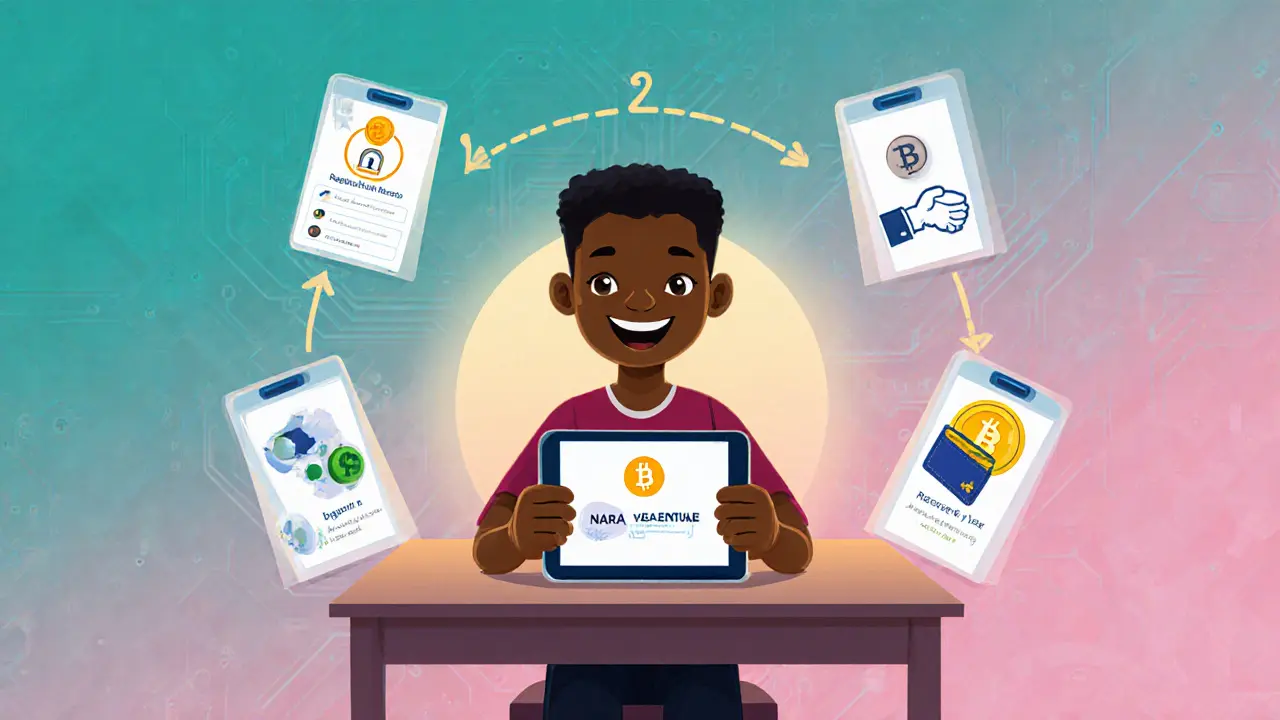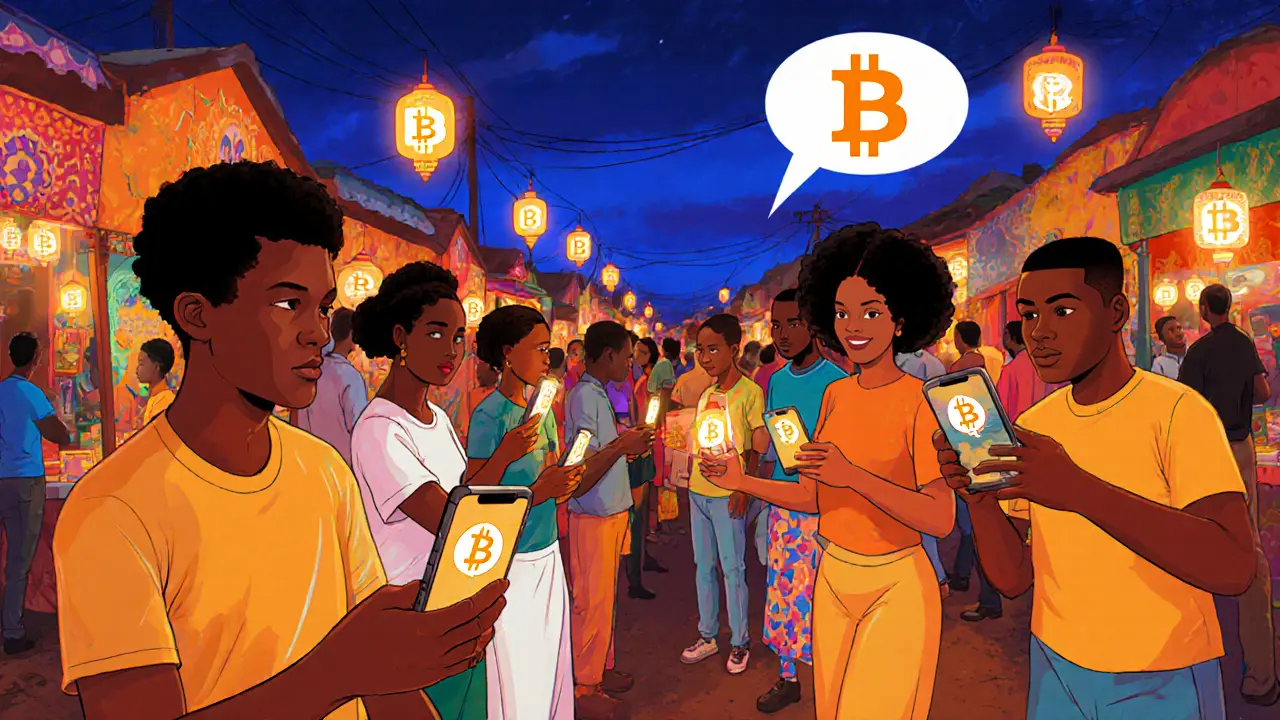Nigeria P2P Crypto Adoption Calculator
Potential Annual Savings
Based on your inputs, switching to P2P crypto trading could save you approximately $0.00 annually.
This represents a 0% reduction in fees compared to traditional remittances.
Additional Insights
With Nigeria's $59 billion in crypto transactions in 2024, P2P trading is becoming increasingly vital for financial inclusion.
According to Chainalysis, Bitcoin/Naira remains the most traded pair, accounting for 57% of all P2P volume.
Nigeria has become the world’s hottest hotspot for peer-to-peer (P2P) cryptocurrency trading, outpacing most developed economies despite deep economic challenges. If you’re wondering how a developing country can dominate the crypto scene, this guide breaks down the forces, numbers, and everyday tools that put Nigeria at the top of the global P2P crypto adoption leaderboard.
TL;DR
- Nigeria ranks in the top three countries for P2P crypto volume, according to 2025 Chainalysis data.
- High inflation, limited banking access, and cheap mobile internet drive the shift to crypto.
- Key platforms - Quidax, Patricia, Luno - power most local trades.
- The Central Bank of Nigeria (CBN) now allows regulated exchanges, bridging P2P and mainstream finance.
- Expect continued growth, but watch for regulatory swings and emerging CBDC competition.
What makes Nigeria a P2P crypto powerhouse?
Between July 2023 and June 2024, Nigerian users moved over $59billion in crypto transactions, according to Cornell Business analysis. That volume placed the country second globally for overall crypto adoption in 2024 and sixth in the September 2025 Chainalysis Global Crypto Adoption Index.
Three macro‑factors converge:
- Currency pressure: Inflation surged past 24% in 2023, while the naira lost more than 75% of its value against the US dollar since 2016. Crypto offers a hedge that traditional savings can’t match.
- Banking gaps: Roughly 36% of adults are unbanked and another 28% are under‑banked. P2P platforms circumvent the need for a local bank account.
- Youth tech adoption: Over 70% of Nigerians under 35 own a smartphone, and mobile data costs are among the cheapest in Africa.
How P2P crypto trading works on the ground
At its core, P2P trading matches a buyer who wants crypto with a seller who wants fiat (naira). The process usually follows these steps:
- Register on a local exchange (e.g., Quidax or Patricia) and complete basic KYC verification.
- Deposit naira into the platform’s escrow wallet.
- Choose a counter‑party and agree on a price. Most trades use the Bitcoin/Naira pair, but Ripple and Dash are also popular.
- Transfer naira to the seller via bank transfer, mobile money, or cash‑pickup.
- Once the seller confirms receipt, the crypto is released from escrow to the buyer’s wallet.
This model sidesteps traditional banking restrictions, which the Central Bank of Nigeria (CBN) imposed in 2017 when it ordered banks to stop handling crypto transactions. The ban forced traders underground, inadvertently sharpening the P2P ecosystem.
Key players shaping the Nigerian P2P landscape
| Platform | Founded | Supported Coins | Unique Feature |
|---|---|---|---|
| Quidax | 2017 | Bitcoin, Ethereum, Dash, Ripple | Lowest escrow fees (1%) |
| Patricia | 2018 | Bitcoin, Litecoin, USDT | Integrated mobile money payouts |
| Luno | 2015 (global, Nigeria 2020) | Bitcoin, Ethereum, BNB, USDC | Educational tutorials in local languages |
All three platforms now operate under a licensing regime introduced by the CBN in late 2023, allowing them to partner with traditional banks for fiat on‑ramps and off‑ramps.

Economic impact: Numbers that matter
By the end of 2024, the Nigerian crypto market generated roughly $3billion in annual transaction volume, growing at an average of 115% year‑over‑year. Here are a few concrete stats:
- Average cost‑saving of 68% per cross‑border transfer compared with traditional remittance services that charge 8‑10% fees.
- Estimated 22million Nigerians (about 10% of the population) will use crypto by the end of 2025.
- Bitcoin/Naira remains the most traded pair, accounting for 57% of all P2P volume.
- The fintech unicorn Moniepoint secured a $1billion valuation partly by integrating crypto services into its payment stack.
These figures hint at a parallel financial system that’s already moving faster, cheaper, and more inclusive than the legacy banking network.
Risks, challenges, and how Nigerians mitigate them
Despite the boom, users face three main hurdles:
- Security concerns: Scams and fake escrow pages still circulate on social media. Most seasoned traders double‑check URLs and rely on platform‑provided escrow.
- Regulatory uncertainty: While the CBN lifted its banking ban in 2023, future policy shifts (especially around anti‑money‑laundering compliance) could tighten access.
- Price volatility: Rapid swings in Bitcoin’s price can erode gains if traders don’t hedge or set stop‑losses.
Community groups on Telegram, WhatsApp, and local meetups provide peer‑to‑peer education. Platforms also publish step‑by‑step guides-Quidax, for example, offers a four‑week “Crypto Basics” video series in English and Yoruba.
The regulatory turning point and institutional adoption
In late 2023, the CBN announced a new licensing framework for crypto exchanges, effectively reversing its earlier stance. This shift unlocked three major developments:
- Licensed exchanges can now link directly with the Nigerian Inter‑Bank Settlement System (NIBSS), enabling near‑instant fiat settlements.
- Digital assets were recognized as securities under the 2025 Investments and Securities Act, giving investors clearer legal protection.
- International banks and fintechs started piloting blockchain‑based clearing services in Lagos.
The convergence of P2P trading and regulated infrastructure suggests a hybrid future where grassroots users and institutional players coexist.
What’s next for Nigeria’s crypto ecosystem?
Analysts at ChainUp project that Nigeria could become Africa’s largest crypto economy by transaction volume within two years. Key trends to watch:
- CBDC rollout: The CBN is testing a digital naira. If adopted, it could either complement P2P trading or create competition, depending on how interoperable it is with existing platforms.
- DeFi integration: Local developers are launching yield‑farms and liquidity pools tailored to the naira‑crypto pair, offering new income streams for everyday users.
- Cross‑border corridors: Partnerships between Nigerian exchanges and Kenyan or Ghanaian platforms could create a West African crypto corridor, further reducing remittance costs.
Bottom line: Nigeria’s P2P crypto adoption isn’t a fleeting fad; it’s a structural shift driven by economic necessity, youthful tech‑savviness, and a regulatory environment that’s slowly catching up.
Frequently Asked Questions
Why do Nigerians prefer P2P crypto over traditional remittance services?
P2P crypto cuts fees to 1‑2% compared with 8‑10% charged by banks and money‑transfer operators, and transactions settle in minutes instead of days. The speed, cost‑savings, and ability to bypass foreign‑exchange controls make it a clear winner for most users.
Is it legal to trade crypto on P2P platforms in Nigeria?
Yes. Since the CBN’s 2023 licensing framework, registered exchanges can operate legally and even partner with banks. Users must complete KYC and adhere to anti‑money‑laundering rules.
Which cryptocurrencies are most popular for P2P trades in Nigeria?
Bitcoin leads the pack, often paired with the naira. Ripple (XRP) and Dash also have strong followings because of low transaction fees and fast confirmation times.
How can a beginner start trading crypto on a P2P platform?
1. Choose a reputable exchange (Quidax, Patricia, or Luno). 2. Complete KYC verification using a national ID and proof of address. 3. Fund your account via bank transfer or mobile money. 4. Select the Bitcoin/Naira pair, set a price, and trade. Most platforms offer in‑app tutorials that walk you through each step.
What are the biggest risks facing Nigeria’s crypto market?
Regulatory reversals, potential clamp‑downs on offshore exchanges, and the upcoming digital naira could reshape the market. Users should stay informed, keep funds in hardware wallets for long‑term holdings, and diversify across platforms.


Chris Hayes
Nigeria's P2P crypto surge is fueled by a mix of high remittance fees and a youthful, tech‑savvy population. The devaluation of the naira pushes people to look for stable stores of value, and Bitcoin/Naira pairs dominate the market. With over $59 billion in crypto volume last year, the ecosystem has matured fast. It’s also why you see a lot of new wallets popping up every month, offering cheaper cross‑border transfers.